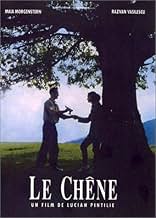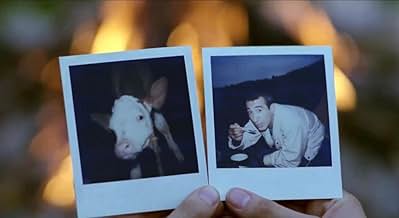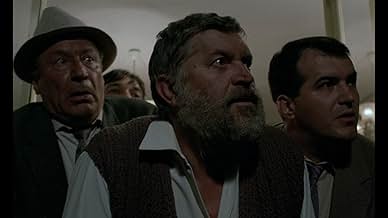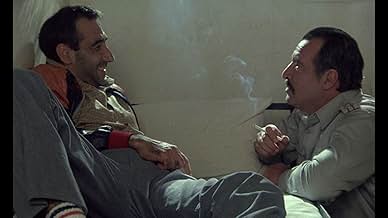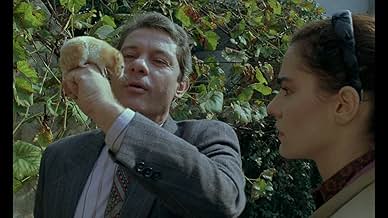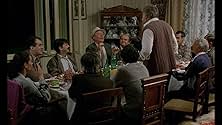VALUTAZIONE IMDb
7,8/10
4130
LA TUA VALUTAZIONE
Una storia della Romania prima della caduta di Ceausescu, attraverso la storia di Nela.Una storia della Romania prima della caduta di Ceausescu, attraverso la storia di Nela.Una storia della Romania prima della caduta di Ceausescu, attraverso la storia di Nela.
- Regia
- Sceneggiatura
- Star
- Premi
- 3 vittorie e 1 candidatura in totale
Recensioni in evidenza
This is the opposite of a Hollywood movie. This is a piece of reality and there is nothing glamorous about it. That's what makes "The Oak" a great movie, an experience to remember.
I am Romanian and I avoided this movie when I was in Romania, because of its subject. Last weekend, I found it in a video store in Seattle and I had to rent it. I am very glad I did and recommend it to all the European film lovers. It will give you an idea (in case you didn't experience it yourself) of what living under the communism meant, with all the pain, frustration and the happier moments.
I am Romanian and I avoided this movie when I was in Romania, because of its subject. Last weekend, I found it in a video store in Seattle and I had to rent it. I am very glad I did and recommend it to all the European film lovers. It will give you an idea (in case you didn't experience it yourself) of what living under the communism meant, with all the pain, frustration and the happier moments.
Society has always been depraved and almost worthless in its general aspects. Now, to look at how people behave during a detention-like state is even more interesting, which swiftly brings me to the following affirmation: living under a dictatorship draws a clear distinction between the elite and the rest. It elevates true values, which unfortunately have to be kept under secrecy due to the paranoid mentality of the government. But the beauty of it, the absolute splendor is to see how these courageous people come together, despite having to sacrifice and risk a lot. I suppose people with similar traits are drawn to one another out of pure instinct.
"Balanta" portrays the destiny of two people who daringly oppose the regime, not for their own fate, but for the fate of those around them who deserve it. Their brave madness is shockingly amusing and thrives within the viewer. Even though playing against the rules can be very tricky, if done according to the (unwritten) book, it can prove extremely rewarding, especially for the spirit. Despite its sometimes eye-brow raising dialogue, Maia Morgenstern and Razvan Vasilescu scratch up reasonably good and humorous performances, pumping adrenaline into the film itself.
The movie is an awe-inspiring tribute to those who could(can) simply not adapt to the nearly psychotic way of life lead by many under totalitarian regimes. Pintile cleverly points out the discrepancies between "actual" normality and the state of things during times when normal becomes strangely unfamiliar. "Balanta" is a worthy picture, especially given its controversial nature.
"Balanta" portrays the destiny of two people who daringly oppose the regime, not for their own fate, but for the fate of those around them who deserve it. Their brave madness is shockingly amusing and thrives within the viewer. Even though playing against the rules can be very tricky, if done according to the (unwritten) book, it can prove extremely rewarding, especially for the spirit. Despite its sometimes eye-brow raising dialogue, Maia Morgenstern and Razvan Vasilescu scratch up reasonably good and humorous performances, pumping adrenaline into the film itself.
The movie is an awe-inspiring tribute to those who could(can) simply not adapt to the nearly psychotic way of life lead by many under totalitarian regimes. Pintile cleverly points out the discrepancies between "actual" normality and the state of things during times when normal becomes strangely unfamiliar. "Balanta" is a worthy picture, especially given its controversial nature.
This film would have been one of the greatest ever if only the actors spoke more naturally! It's extremely strange to hear such talented actors (Maia Morgenstern, Razvan Dumitrescu and a few others) throw their lines with almost the same intonation every time. I don't know how the great director Pintilie accepted that (or is there some 'hidden' symbol in that?). First I have read the excellent novel by Ion Baiesu (one of my favorite authors when it comes to humor), and I was thrilled by its real feel, biting satire and cruel situations. It has memorable characters and formidable dark humor. So the film was a little disappointing for me, but it's still a 'must re-watch' any time. A special note for the cameos by Victor Rebengiuc and Dorel Visan, two of the best actors I've ever seen.
I' give'it a ten because character Mitica is based on a real life person that happens to be my father(not biological but the person who raised me). My father is a urological surgeon that never took money from his patients (I know sounds unrealistic especially for Romania, but is true). One of his patients was Ion Baiesu, who was really impressed by him so he wrote the short novel "thirty-eight point two" and dedicated him. Also the movie "Mere Rosii" (red apples) is about my father.
If you want to know more just e-mail me at Whitenight2mw on yahoo.
Soryy if my grammar isn't so good.
If you want to know more just e-mail me at Whitenight2mw on yahoo.
Soryy if my grammar isn't so good.
At the time I read the book the film is based on, it was a reflection of the reality surrounding us, in Romania, therefore after the first print it was banned by the Ceausescu's communist regime. As time went by, I emigrated in the US, and seen the movie 10 years after I've read the book and although the movie supposedly is a fiction, it played like a documentary in front of my eyes. It is hard, as a Romanian, to disconnect from my personal experiences, but if anybody is interested in what the communism in Romania was like, this movie is the way to find out. The tragic and the comedy are coming together to weave the fabric of a society so sick, that life becomes surreal. For my money this is a great movie, the fresco of a society governed by rules unknown to civilization.
Lo sapevi?
- ConnessioniFeatured in Filmare/Filmage (1992)
I più visti
Accedi per valutare e creare un elenco di titoli salvati per ottenere consigli personalizzati
Dettagli
Botteghino
- Budget
- 3.700.000 USD (previsto)
Contribuisci a questa pagina
Suggerisci una modifica o aggiungi i contenuti mancanti

